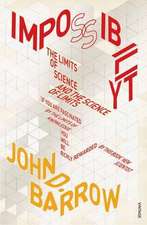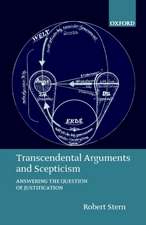The Myth of the Closed Mind: Understanding Why and How People Are Rational
Autor Ray Scott Percivalen Limba Engleză Paperback – 31 dec 2011
It's often claimed that some people--fundamentalists or fanatics--are indeed sealed off from rational criticism. And every month new pop psychology books appear, describing the dumb ways ordinary people make decisions, as revealed by psychological experiments. The conclusion is that all or most people are fundamentally irrational.
Ray Scott Percival sets out to demolish the whole notion of the closed mind and of human irrationality. There is a difference between making mistakes and being irrational. Though humans are prone to mistakes, they remain rational. In fact, making mistakes is a sign of rationality: a totally non-rational entity could not make a mistake.
Rationality does not mean absence of error; it means the possibility of correcting error in the light of criticism. In this sense, all human beliefs are rational: they are all vulnerable to being abandoned when shown to be faulty.
Percival agrees that people cling stubbornly to their beliefs, but he maintains, first, that not being too ready to abandon one's beliefs is rational.
Preț: 278.88 lei
Nou
Puncte Express: 418
Preț estimativ în valută:
53.37€ • 57.95$ • 44.83£
53.37€ • 57.95$ • 44.83£
Carte disponibilă
Livrare economică 02-16 aprilie
Preluare comenzi: 021 569.72.76
Specificații
ISBN-13: 9780812696851
ISBN-10: 0812696859
Pagini: 304
Dimensiuni: 150 x 226 x 20 mm
Greutate: 0.43 kg
Editura: Open Court Publishing Company
ISBN-10: 0812696859
Pagini: 304
Dimensiuni: 150 x 226 x 20 mm
Greutate: 0.43 kg
Editura: Open Court Publishing Company
Recenzii
“At last, a twenty-first century philosopher willing to stand up and argue for the power of sheer human rationality. Because Ray Percival is so convinced, correctly, of the impact of a rational argument on the human intellect, he is unafraid to offer a no-holds-barred, comprehensive brief on the strength of rationality. Surveying history and reason from Socrates to today’s age of terrorism, Percival has written a tract that Milton, Jefferson, Mill, or Popper would be proud of. The next time I get into an argument with a well-meaning person who wishes to censor a propagandistic, corporate, or individually hateful point of view, I will recommend a reading of Percival’s The Myth of the Closed Mind.”
—PAUL LEVINSON, author of New New Media
“Ray Percival calls his own view outrageous, and it does indeed outrage the sensibilities of today’s shallow and fashionable intellectuals, who continually bleat about human irrationality. But even those already disposed to agree with Percival and Aristotle that humans are rational animals will still be repeatedly surprised by the many delightful, witty, and profound insights in The Myth of the Closed Mind. How much better to have written one classic work than a hundred meretricious potboilers. If he were henceforth to write nothing else, Professor Percival has his classic.”
—J.C. LESTER, author of Escape from Leviathan
“Some of what Percival claims is outrageous but some of it is not. Even though he may not convince most of his readers, many of his arguments are both ingenious and entertaining—and often point to unresolved issues in the theory of rationality.”
—JAMES FETZER, author of The Evolution of Intelligence and Render Unto Darwin
"At last, a twenty-first century philosopher willing to stand up and argue for the power of sheer human rationality. Because Ray Percival is so convinced, correctly, of the impact of a rational argument on the human intellect, he is unafraid to offer a no-holds-barred, comprehensive brief on the strength of rationality. Surveying history and reason from Socrates to today's age of terrorism, Percival has written a tract that Milton, Jefferson, Mill, or Popper would be proud of. The next time I get into an argument with a well-meaning person who wishes to censor a propagandistic, corporate, or individually hateful point of view, I will recommend a reading of Percival's "The Myth of the Closed Mind"." --PAUL LEVINSON, author of "New New Media""Ray Percival calls his own view outrageous, and it does indeed outrage the sensibilities of today's shallow and fashionable intellectuals, who continually bleat about human irrationality. But even those already disposed to agree with Percival and Aristotle that humans are rational animals will still be repeatedly surprised by the many delightful, witty, and profound insights in "The Myth of the Closed Mind". How much better to have written one classic work than a hundred meretricious potboilers. If he were henceforth to write nothing else, Professor Percival has his classic." --J.C. LESTER, author of "Escape from Leviathan""Some of what Percival claims is outrageous but some of it is not. Even though he may not convince most of his readers, many of his arguments are both ingenious and entertaining--and often point to unresolved issues in the theory of rationality." --JAMES FETZER, author of "The Evolution of Intelligence and Render Unto Darwin"
Notă biografică
RAY SCOTT PERCIVAL is founder and editor of the Karl Popper Web and was the organizer of the Annual Conference on the Philosophy of Sir Karl Popper, 1988–1998, both sponsored by the Open Society Institute of George Soros. In 2000 he was listed by Barron’s Who’s Who as one of five hundred “world leaders for the new century.” He has taught at the University of Lancaster and now teaches philosophy at the United Arab Emirates University. His YouTube channel is NaiveRealist.
Descriere
“It’s like talking to a brick wall” and “We’ll have to agree to disagree” are popular sayings referring to the frustrating experience of discussing issues with people who seem to be beyond the reach of argument.
It’s often claimed that some people—fundamentalists or fanatics—are indeed sealed off from rational criticism. And every month new pop psychology books appear, describing the dumb ways ordinary people make decisions, as revealed by psychological experiments. The conclusion is that all or most people are fundamentally irrational.
Ray Scott Percival sets out to demolish the whole notion of the closed mind and of human irrationality. There is a difference between making mistakes and being irrational. Though humans are prone to mistakes, they remain rational. In fact, making mistakes is a sign of rationality: a totally non-rational entity could not make a mistake.
Rationality does not mean absence of error; it means the possibility of correcting error in the light of criticism. In this sense, all human beliefs are rational: they are all vulnerable to being abandoned when shown to be faulty.
Percival agrees that people cling stubbornly to their beliefs, but he maintains, first, that not being too ready to abandon one’s beliefs is rational.
It’s often claimed that some people—fundamentalists or fanatics—are indeed sealed off from rational criticism. And every month new pop psychology books appear, describing the dumb ways ordinary people make decisions, as revealed by psychological experiments. The conclusion is that all or most people are fundamentally irrational.
Ray Scott Percival sets out to demolish the whole notion of the closed mind and of human irrationality. There is a difference between making mistakes and being irrational. Though humans are prone to mistakes, they remain rational. In fact, making mistakes is a sign of rationality: a totally non-rational entity could not make a mistake.
Rationality does not mean absence of error; it means the possibility of correcting error in the light of criticism. In this sense, all human beliefs are rational: they are all vulnerable to being abandoned when shown to be faulty.
Percival agrees that people cling stubbornly to their beliefs, but he maintains, first, that not being too ready to abandon one’s beliefs is rational.




















